EVRE5017 Evaluation and Reflection Project Portfolio
VerifiedAdded on 2023/04/11
|17
|4286
|480
Project
AI Summary
This project portfolio, submitted for the EVRE5017 Evaluation and Reflection module, presents a student's reflections and career development plan. Task 1a focuses on a critical incident from the first week of learning, employing Gibb's reflective model to analyze the student's experience, feelings, and learning outcomes related to communication and self-expression. Task 1b provides a reflective report spanning 10 weeks, detailing the student's professional development, use of reflective models, and insights gained from various learning activities and assessments. Finally, Task 2 outlines a career and personal development plan, including personal analysis, SMART goals, and personal objectives designed to enhance skills and prepare for future professional endeavors. The student demonstrates the ability to relate academic theory to the work environment and recognizes the contribution of practice to the development of theory.
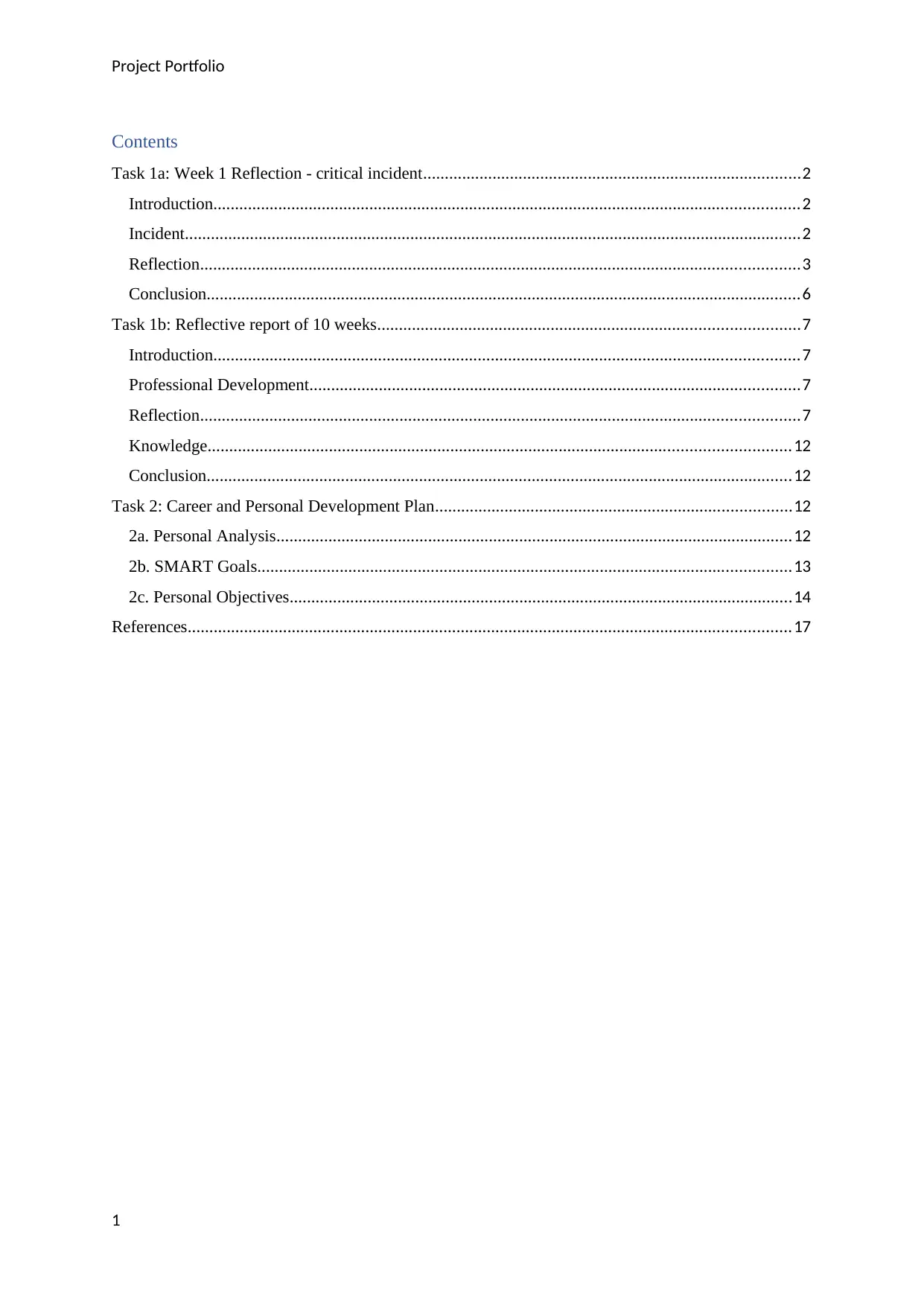
Project Portfolio
Contents
Task 1a: Week 1 Reflection - critical incident.......................................................................................2
Introduction.......................................................................................................................................2
Incident..............................................................................................................................................2
Reflection..........................................................................................................................................3
Conclusion.........................................................................................................................................6
Task 1b: Reflective report of 10 weeks.................................................................................................7
Introduction.......................................................................................................................................7
Professional Development.................................................................................................................7
Reflection..........................................................................................................................................7
Knowledge......................................................................................................................................12
Conclusion.......................................................................................................................................12
Task 2: Career and Personal Development Plan..................................................................................12
2a. Personal Analysis.......................................................................................................................12
2b. SMART Goals...........................................................................................................................13
2c. Personal Objectives....................................................................................................................14
References...........................................................................................................................................17
1
Contents
Task 1a: Week 1 Reflection - critical incident.......................................................................................2
Introduction.......................................................................................................................................2
Incident..............................................................................................................................................2
Reflection..........................................................................................................................................3
Conclusion.........................................................................................................................................6
Task 1b: Reflective report of 10 weeks.................................................................................................7
Introduction.......................................................................................................................................7
Professional Development.................................................................................................................7
Reflection..........................................................................................................................................7
Knowledge......................................................................................................................................12
Conclusion.......................................................................................................................................12
Task 2: Career and Personal Development Plan..................................................................................12
2a. Personal Analysis.......................................................................................................................12
2b. SMART Goals...........................................................................................................................13
2c. Personal Objectives....................................................................................................................14
References...........................................................................................................................................17
1
Paraphrase This Document
Need a fresh take? Get an instant paraphrase of this document with our AI Paraphraser
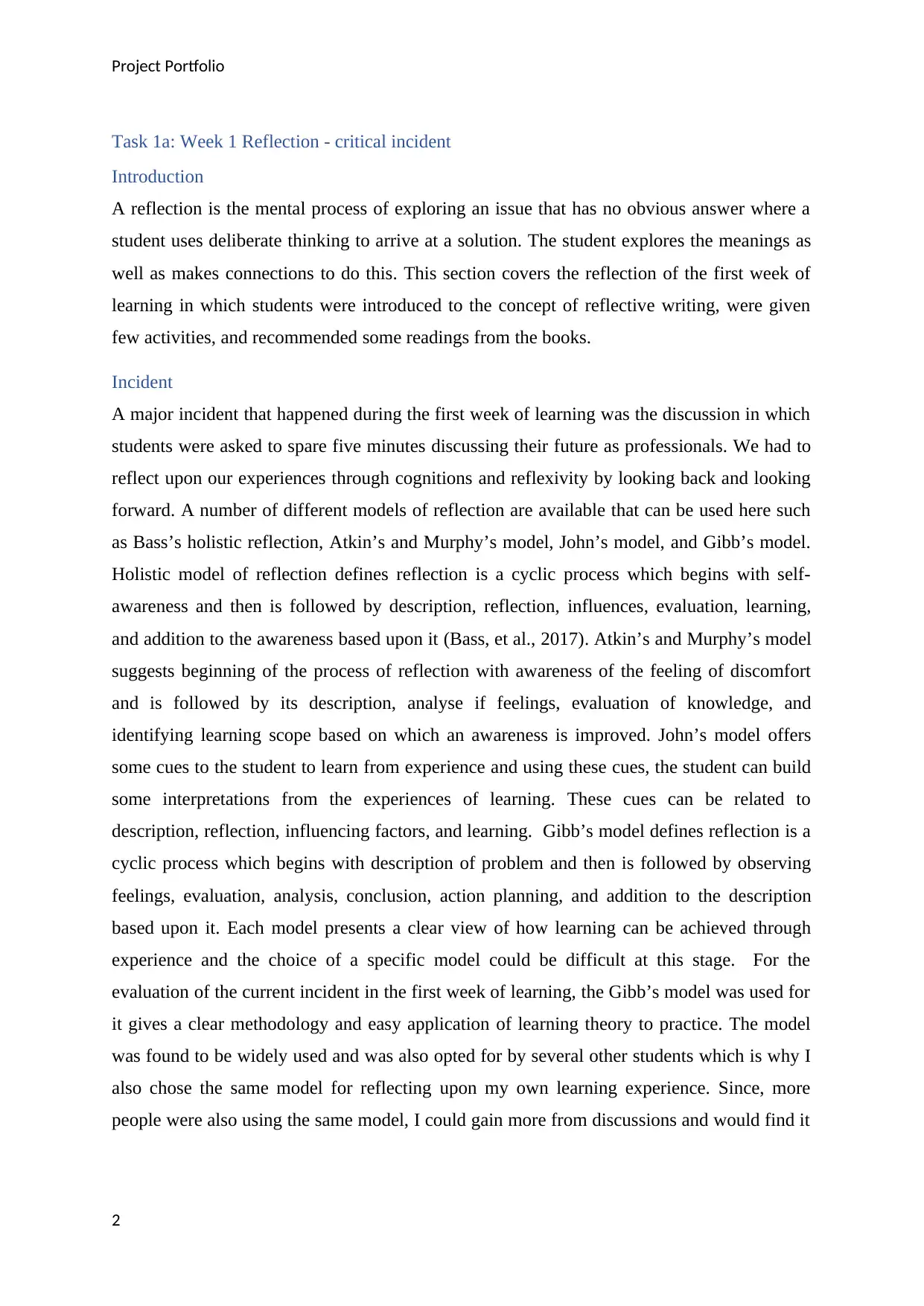
Project Portfolio
Task 1a: Week 1 Reflection - critical incident
Introduction
A reflection is the mental process of exploring an issue that has no obvious answer where a
student uses deliberate thinking to arrive at a solution. The student explores the meanings as
well as makes connections to do this. This section covers the reflection of the first week of
learning in which students were introduced to the concept of reflective writing, were given
few activities, and recommended some readings from the books.
Incident
A major incident that happened during the first week of learning was the discussion in which
students were asked to spare five minutes discussing their future as professionals. We had to
reflect upon our experiences through cognitions and reflexivity by looking back and looking
forward. A number of different models of reflection are available that can be used here such
as Bass’s holistic reflection, Atkin’s and Murphy’s model, John’s model, and Gibb’s model.
Holistic model of reflection defines reflection is a cyclic process which begins with self-
awareness and then is followed by description, reflection, influences, evaluation, learning,
and addition to the awareness based upon it (Bass, et al., 2017). Atkin’s and Murphy’s model
suggests beginning of the process of reflection with awareness of the feeling of discomfort
and is followed by its description, analyse if feelings, evaluation of knowledge, and
identifying learning scope based on which an awareness is improved. John’s model offers
some cues to the student to learn from experience and using these cues, the student can build
some interpretations from the experiences of learning. These cues can be related to
description, reflection, influencing factors, and learning. Gibb’s model defines reflection is a
cyclic process which begins with description of problem and then is followed by observing
feelings, evaluation, analysis, conclusion, action planning, and addition to the description
based upon it. Each model presents a clear view of how learning can be achieved through
experience and the choice of a specific model could be difficult at this stage. For the
evaluation of the current incident in the first week of learning, the Gibb’s model was used for
it gives a clear methodology and easy application of learning theory to practice. The model
was found to be widely used and was also opted for by several other students which is why I
also chose the same model for reflecting upon my own learning experience. Since, more
people were also using the same model, I could gain more from discussions and would find it
2
Task 1a: Week 1 Reflection - critical incident
Introduction
A reflection is the mental process of exploring an issue that has no obvious answer where a
student uses deliberate thinking to arrive at a solution. The student explores the meanings as
well as makes connections to do this. This section covers the reflection of the first week of
learning in which students were introduced to the concept of reflective writing, were given
few activities, and recommended some readings from the books.
Incident
A major incident that happened during the first week of learning was the discussion in which
students were asked to spare five minutes discussing their future as professionals. We had to
reflect upon our experiences through cognitions and reflexivity by looking back and looking
forward. A number of different models of reflection are available that can be used here such
as Bass’s holistic reflection, Atkin’s and Murphy’s model, John’s model, and Gibb’s model.
Holistic model of reflection defines reflection is a cyclic process which begins with self-
awareness and then is followed by description, reflection, influences, evaluation, learning,
and addition to the awareness based upon it (Bass, et al., 2017). Atkin’s and Murphy’s model
suggests beginning of the process of reflection with awareness of the feeling of discomfort
and is followed by its description, analyse if feelings, evaluation of knowledge, and
identifying learning scope based on which an awareness is improved. John’s model offers
some cues to the student to learn from experience and using these cues, the student can build
some interpretations from the experiences of learning. These cues can be related to
description, reflection, influencing factors, and learning. Gibb’s model defines reflection is a
cyclic process which begins with description of problem and then is followed by observing
feelings, evaluation, analysis, conclusion, action planning, and addition to the description
based upon it. Each model presents a clear view of how learning can be achieved through
experience and the choice of a specific model could be difficult at this stage. For the
evaluation of the current incident in the first week of learning, the Gibb’s model was used for
it gives a clear methodology and easy application of learning theory to practice. The model
was found to be widely used and was also opted for by several other students which is why I
also chose the same model for reflecting upon my own learning experience. Since, more
people were also using the same model, I could gain more from discussions and would find it
2
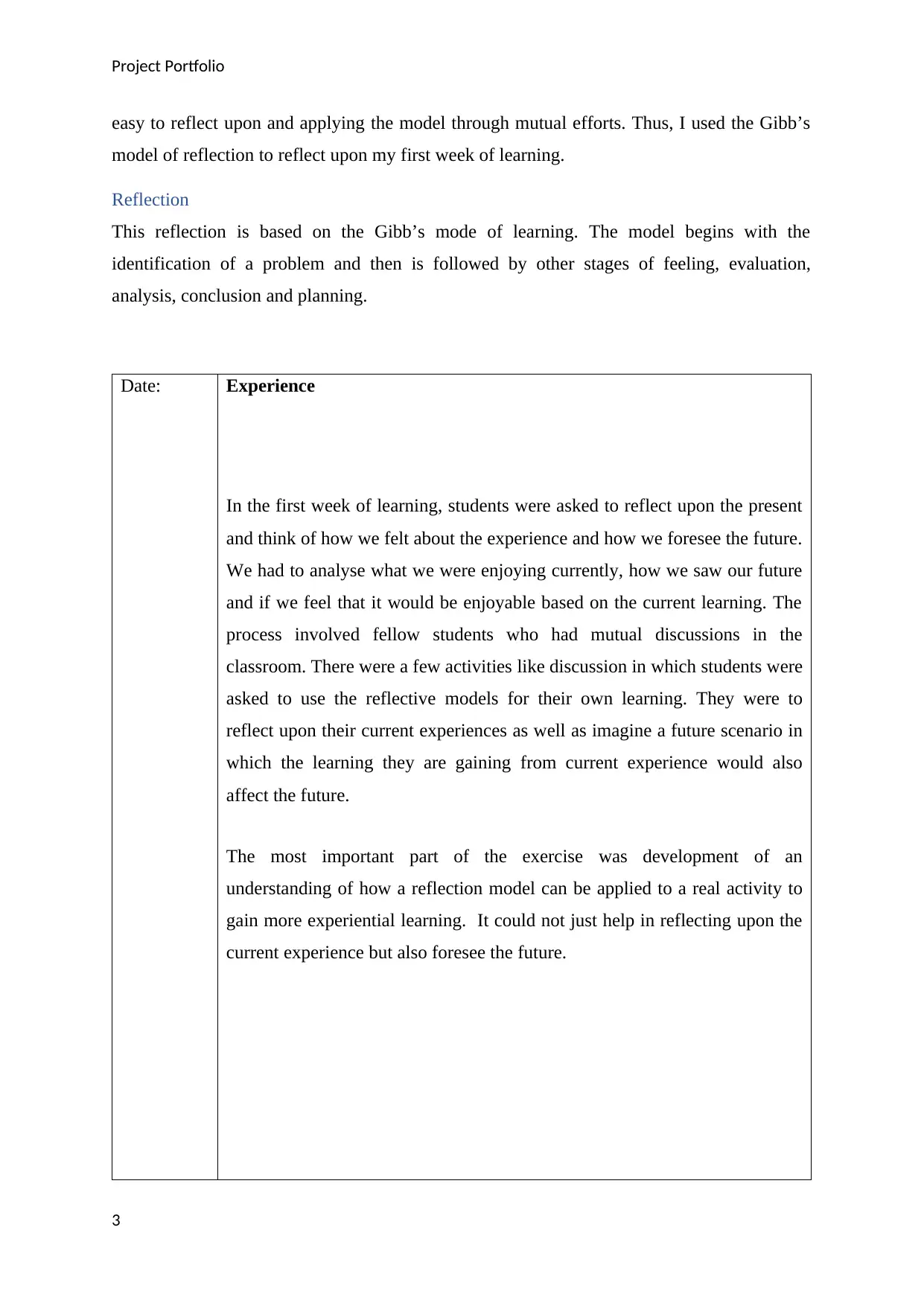
Project Portfolio
easy to reflect upon and applying the model through mutual efforts. Thus, I used the Gibb’s
model of reflection to reflect upon my first week of learning.
Reflection
This reflection is based on the Gibb’s mode of learning. The model begins with the
identification of a problem and then is followed by other stages of feeling, evaluation,
analysis, conclusion and planning.
Date: Experience
In the first week of learning, students were asked to reflect upon the present
and think of how we felt about the experience and how we foresee the future.
We had to analyse what we were enjoying currently, how we saw our future
and if we feel that it would be enjoyable based on the current learning. The
process involved fellow students who had mutual discussions in the
classroom. There were a few activities like discussion in which students were
asked to use the reflective models for their own learning. They were to
reflect upon their current experiences as well as imagine a future scenario in
which the learning they are gaining from current experience would also
affect the future.
The most important part of the exercise was development of an
understanding of how a reflection model can be applied to a real activity to
gain more experiential learning. It could not just help in reflecting upon the
current experience but also foresee the future.
3
easy to reflect upon and applying the model through mutual efforts. Thus, I used the Gibb’s
model of reflection to reflect upon my first week of learning.
Reflection
This reflection is based on the Gibb’s mode of learning. The model begins with the
identification of a problem and then is followed by other stages of feeling, evaluation,
analysis, conclusion and planning.
Date: Experience
In the first week of learning, students were asked to reflect upon the present
and think of how we felt about the experience and how we foresee the future.
We had to analyse what we were enjoying currently, how we saw our future
and if we feel that it would be enjoyable based on the current learning. The
process involved fellow students who had mutual discussions in the
classroom. There were a few activities like discussion in which students were
asked to use the reflective models for their own learning. They were to
reflect upon their current experiences as well as imagine a future scenario in
which the learning they are gaining from current experience would also
affect the future.
The most important part of the exercise was development of an
understanding of how a reflection model can be applied to a real activity to
gain more experiential learning. It could not just help in reflecting upon the
current experience but also foresee the future.
3
⊘ This is a preview!⊘
Do you want full access?
Subscribe today to unlock all pages.

Trusted by 1+ million students worldwide
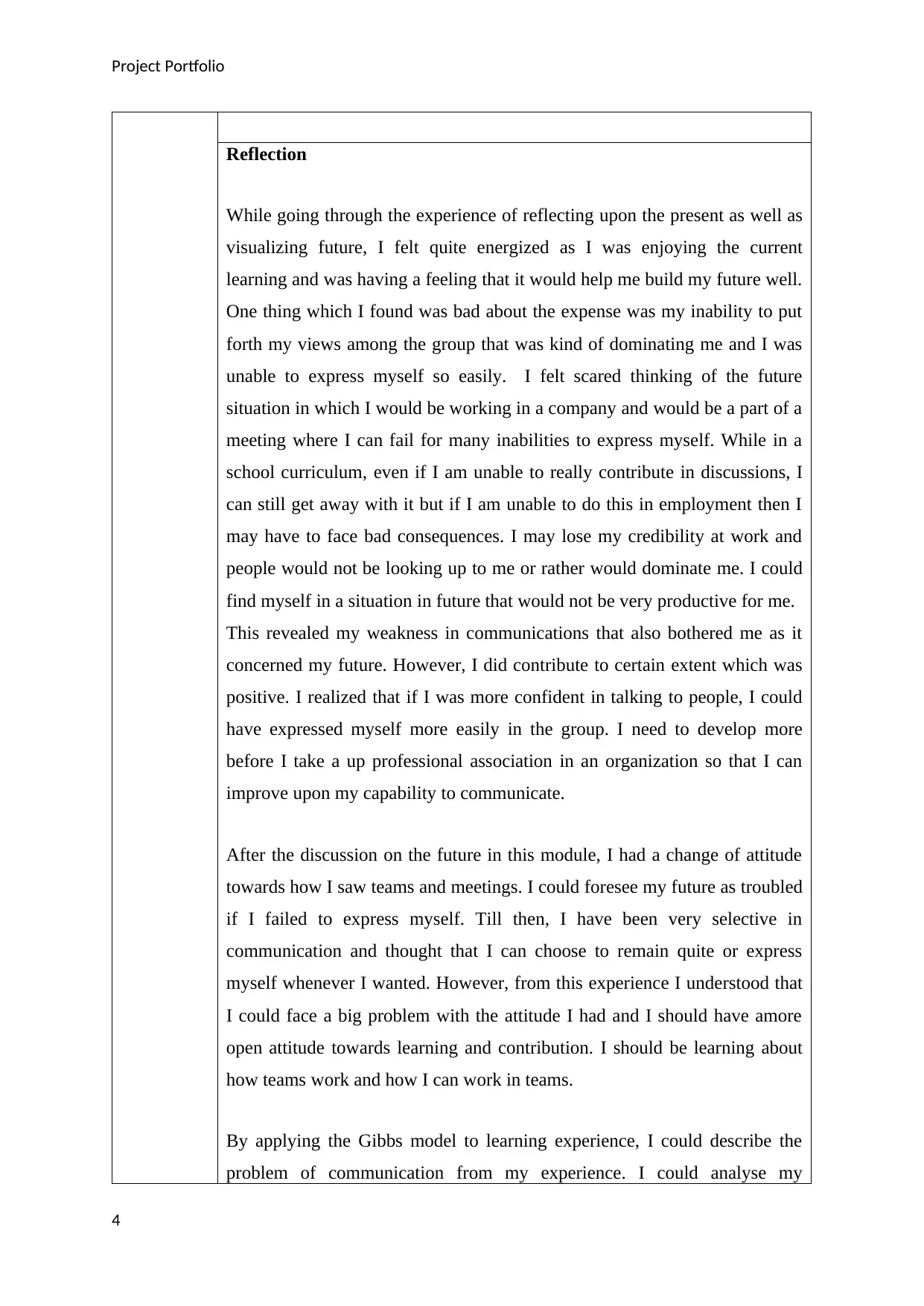
Project Portfolio
Reflection
While going through the experience of reflecting upon the present as well as
visualizing future, I felt quite energized as I was enjoying the current
learning and was having a feeling that it would help me build my future well.
One thing which I found was bad about the expense was my inability to put
forth my views among the group that was kind of dominating me and I was
unable to express myself so easily. I felt scared thinking of the future
situation in which I would be working in a company and would be a part of a
meeting where I can fail for many inabilities to express myself. While in a
school curriculum, even if I am unable to really contribute in discussions, I
can still get away with it but if I am unable to do this in employment then I
may have to face bad consequences. I may lose my credibility at work and
people would not be looking up to me or rather would dominate me. I could
find myself in a situation in future that would not be very productive for me.
This revealed my weakness in communications that also bothered me as it
concerned my future. However, I did contribute to certain extent which was
positive. I realized that if I was more confident in talking to people, I could
have expressed myself more easily in the group. I need to develop more
before I take a up professional association in an organization so that I can
improve upon my capability to communicate.
After the discussion on the future in this module, I had a change of attitude
towards how I saw teams and meetings. I could foresee my future as troubled
if I failed to express myself. Till then, I have been very selective in
communication and thought that I can choose to remain quite or express
myself whenever I wanted. However, from this experience I understood that
I could face a big problem with the attitude I had and I should have amore
open attitude towards learning and contribution. I should be learning about
how teams work and how I can work in teams.
By applying the Gibbs model to learning experience, I could describe the
problem of communication from my experience. I could analyse my
4
Reflection
While going through the experience of reflecting upon the present as well as
visualizing future, I felt quite energized as I was enjoying the current
learning and was having a feeling that it would help me build my future well.
One thing which I found was bad about the expense was my inability to put
forth my views among the group that was kind of dominating me and I was
unable to express myself so easily. I felt scared thinking of the future
situation in which I would be working in a company and would be a part of a
meeting where I can fail for many inabilities to express myself. While in a
school curriculum, even if I am unable to really contribute in discussions, I
can still get away with it but if I am unable to do this in employment then I
may have to face bad consequences. I may lose my credibility at work and
people would not be looking up to me or rather would dominate me. I could
find myself in a situation in future that would not be very productive for me.
This revealed my weakness in communications that also bothered me as it
concerned my future. However, I did contribute to certain extent which was
positive. I realized that if I was more confident in talking to people, I could
have expressed myself more easily in the group. I need to develop more
before I take a up professional association in an organization so that I can
improve upon my capability to communicate.
After the discussion on the future in this module, I had a change of attitude
towards how I saw teams and meetings. I could foresee my future as troubled
if I failed to express myself. Till then, I have been very selective in
communication and thought that I can choose to remain quite or express
myself whenever I wanted. However, from this experience I understood that
I could face a big problem with the attitude I had and I should have amore
open attitude towards learning and contribution. I should be learning about
how teams work and how I can work in teams.
By applying the Gibbs model to learning experience, I could describe the
problem of communication from my experience. I could analyse my
4
Paraphrase This Document
Need a fresh take? Get an instant paraphrase of this document with our AI Paraphraser
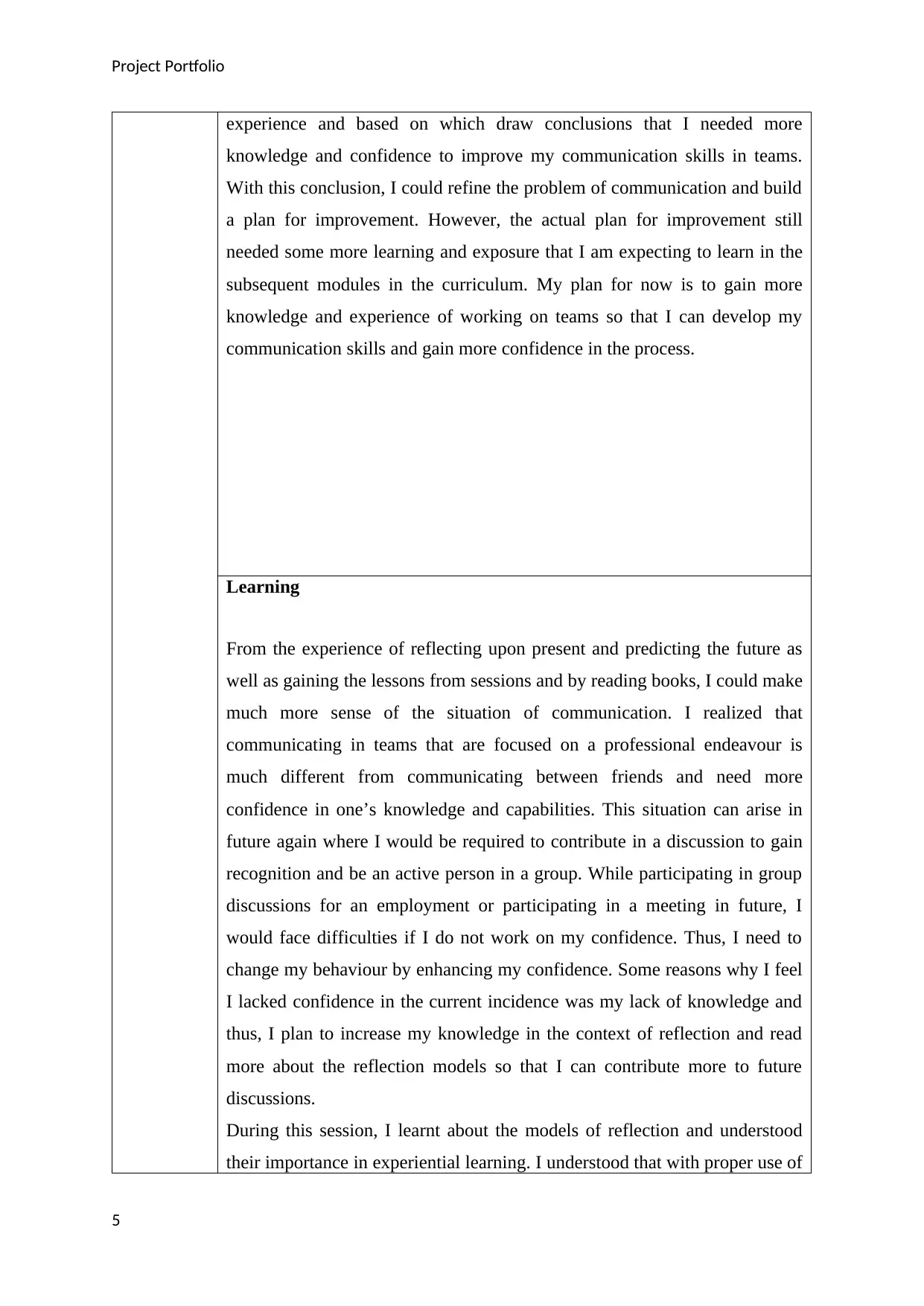
Project Portfolio
experience and based on which draw conclusions that I needed more
knowledge and confidence to improve my communication skills in teams.
With this conclusion, I could refine the problem of communication and build
a plan for improvement. However, the actual plan for improvement still
needed some more learning and exposure that I am expecting to learn in the
subsequent modules in the curriculum. My plan for now is to gain more
knowledge and experience of working on teams so that I can develop my
communication skills and gain more confidence in the process.
Learning
From the experience of reflecting upon present and predicting the future as
well as gaining the lessons from sessions and by reading books, I could make
much more sense of the situation of communication. I realized that
communicating in teams that are focused on a professional endeavour is
much different from communicating between friends and need more
confidence in one’s knowledge and capabilities. This situation can arise in
future again where I would be required to contribute in a discussion to gain
recognition and be an active person in a group. While participating in group
discussions for an employment or participating in a meeting in future, I
would face difficulties if I do not work on my confidence. Thus, I need to
change my behaviour by enhancing my confidence. Some reasons why I feel
I lacked confidence in the current incidence was my lack of knowledge and
thus, I plan to increase my knowledge in the context of reflection and read
more about the reflection models so that I can contribute more to future
discussions.
During this session, I learnt about the models of reflection and understood
their importance in experiential learning. I understood that with proper use of
5
experience and based on which draw conclusions that I needed more
knowledge and confidence to improve my communication skills in teams.
With this conclusion, I could refine the problem of communication and build
a plan for improvement. However, the actual plan for improvement still
needed some more learning and exposure that I am expecting to learn in the
subsequent modules in the curriculum. My plan for now is to gain more
knowledge and experience of working on teams so that I can develop my
communication skills and gain more confidence in the process.
Learning
From the experience of reflecting upon present and predicting the future as
well as gaining the lessons from sessions and by reading books, I could make
much more sense of the situation of communication. I realized that
communicating in teams that are focused on a professional endeavour is
much different from communicating between friends and need more
confidence in one’s knowledge and capabilities. This situation can arise in
future again where I would be required to contribute in a discussion to gain
recognition and be an active person in a group. While participating in group
discussions for an employment or participating in a meeting in future, I
would face difficulties if I do not work on my confidence. Thus, I need to
change my behaviour by enhancing my confidence. Some reasons why I feel
I lacked confidence in the current incidence was my lack of knowledge and
thus, I plan to increase my knowledge in the context of reflection and read
more about the reflection models so that I can contribute more to future
discussions.
During this session, I learnt about the models of reflection and understood
their importance in experiential learning. I understood that with proper use of
5
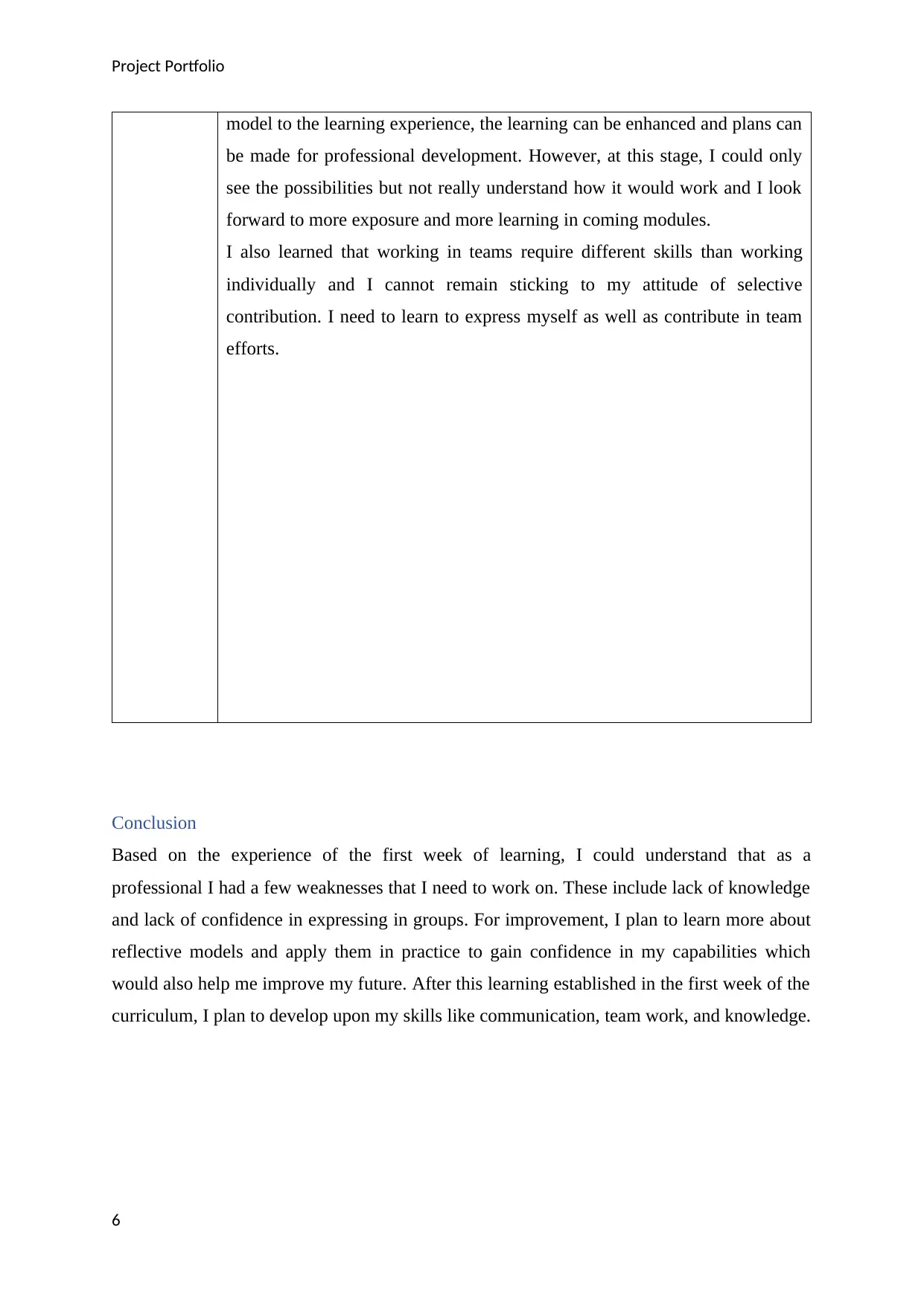
Project Portfolio
model to the learning experience, the learning can be enhanced and plans can
be made for professional development. However, at this stage, I could only
see the possibilities but not really understand how it would work and I look
forward to more exposure and more learning in coming modules.
I also learned that working in teams require different skills than working
individually and I cannot remain sticking to my attitude of selective
contribution. I need to learn to express myself as well as contribute in team
efforts.
Conclusion
Based on the experience of the first week of learning, I could understand that as a
professional I had a few weaknesses that I need to work on. These include lack of knowledge
and lack of confidence in expressing in groups. For improvement, I plan to learn more about
reflective models and apply them in practice to gain confidence in my capabilities which
would also help me improve my future. After this learning established in the first week of the
curriculum, I plan to develop upon my skills like communication, team work, and knowledge.
6
model to the learning experience, the learning can be enhanced and plans can
be made for professional development. However, at this stage, I could only
see the possibilities but not really understand how it would work and I look
forward to more exposure and more learning in coming modules.
I also learned that working in teams require different skills than working
individually and I cannot remain sticking to my attitude of selective
contribution. I need to learn to express myself as well as contribute in team
efforts.
Conclusion
Based on the experience of the first week of learning, I could understand that as a
professional I had a few weaknesses that I need to work on. These include lack of knowledge
and lack of confidence in expressing in groups. For improvement, I plan to learn more about
reflective models and apply them in practice to gain confidence in my capabilities which
would also help me improve my future. After this learning established in the first week of the
curriculum, I plan to develop upon my skills like communication, team work, and knowledge.
6
⊘ This is a preview!⊘
Do you want full access?
Subscribe today to unlock all pages.

Trusted by 1+ million students worldwide
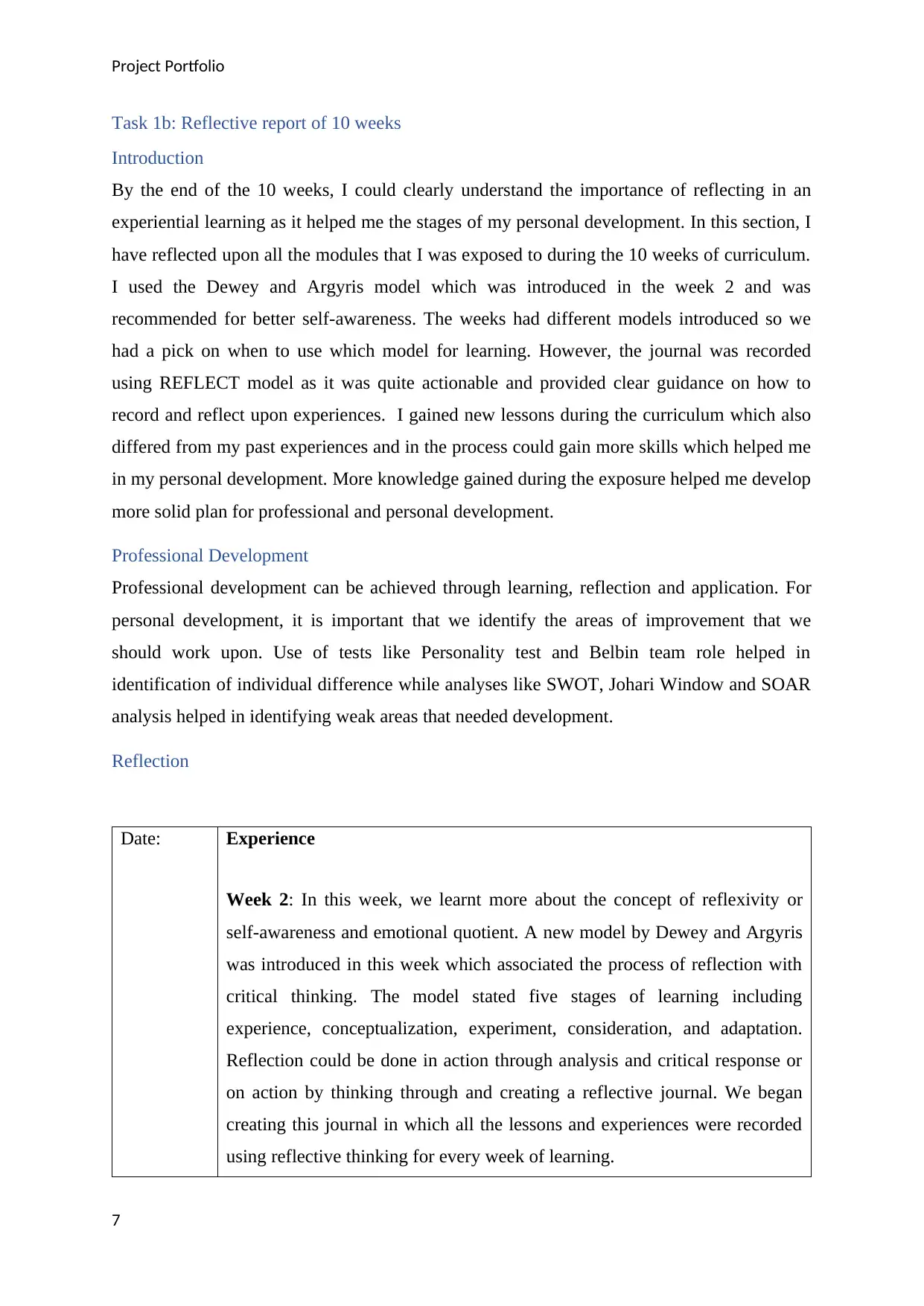
Project Portfolio
Task 1b: Reflective report of 10 weeks
Introduction
By the end of the 10 weeks, I could clearly understand the importance of reflecting in an
experiential learning as it helped me the stages of my personal development. In this section, I
have reflected upon all the modules that I was exposed to during the 10 weeks of curriculum.
I used the Dewey and Argyris model which was introduced in the week 2 and was
recommended for better self-awareness. The weeks had different models introduced so we
had a pick on when to use which model for learning. However, the journal was recorded
using REFLECT model as it was quite actionable and provided clear guidance on how to
record and reflect upon experiences. I gained new lessons during the curriculum which also
differed from my past experiences and in the process could gain more skills which helped me
in my personal development. More knowledge gained during the exposure helped me develop
more solid plan for professional and personal development.
Professional Development
Professional development can be achieved through learning, reflection and application. For
personal development, it is important that we identify the areas of improvement that we
should work upon. Use of tests like Personality test and Belbin team role helped in
identification of individual difference while analyses like SWOT, Johari Window and SOAR
analysis helped in identifying weak areas that needed development.
Reflection
Date: Experience
Week 2: In this week, we learnt more about the concept of reflexivity or
self-awareness and emotional quotient. A new model by Dewey and Argyris
was introduced in this week which associated the process of reflection with
critical thinking. The model stated five stages of learning including
experience, conceptualization, experiment, consideration, and adaptation.
Reflection could be done in action through analysis and critical response or
on action by thinking through and creating a reflective journal. We began
creating this journal in which all the lessons and experiences were recorded
using reflective thinking for every week of learning.
7
Task 1b: Reflective report of 10 weeks
Introduction
By the end of the 10 weeks, I could clearly understand the importance of reflecting in an
experiential learning as it helped me the stages of my personal development. In this section, I
have reflected upon all the modules that I was exposed to during the 10 weeks of curriculum.
I used the Dewey and Argyris model which was introduced in the week 2 and was
recommended for better self-awareness. The weeks had different models introduced so we
had a pick on when to use which model for learning. However, the journal was recorded
using REFLECT model as it was quite actionable and provided clear guidance on how to
record and reflect upon experiences. I gained new lessons during the curriculum which also
differed from my past experiences and in the process could gain more skills which helped me
in my personal development. More knowledge gained during the exposure helped me develop
more solid plan for professional and personal development.
Professional Development
Professional development can be achieved through learning, reflection and application. For
personal development, it is important that we identify the areas of improvement that we
should work upon. Use of tests like Personality test and Belbin team role helped in
identification of individual difference while analyses like SWOT, Johari Window and SOAR
analysis helped in identifying weak areas that needed development.
Reflection
Date: Experience
Week 2: In this week, we learnt more about the concept of reflexivity or
self-awareness and emotional quotient. A new model by Dewey and Argyris
was introduced in this week which associated the process of reflection with
critical thinking. The model stated five stages of learning including
experience, conceptualization, experiment, consideration, and adaptation.
Reflection could be done in action through analysis and critical response or
on action by thinking through and creating a reflective journal. We began
creating this journal in which all the lessons and experiences were recorded
using reflective thinking for every week of learning.
7
Paraphrase This Document
Need a fresh take? Get an instant paraphrase of this document with our AI Paraphraser
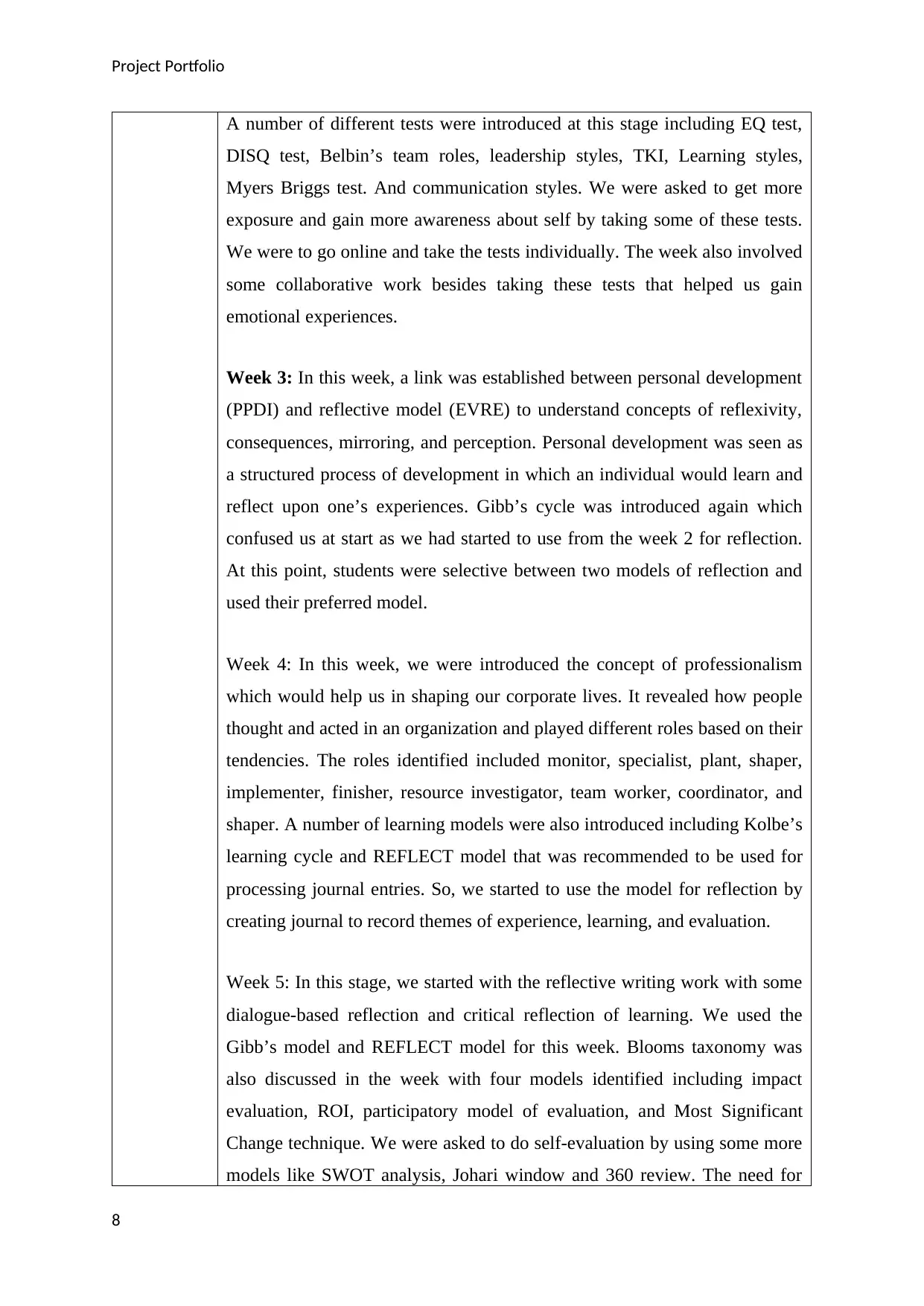
Project Portfolio
A number of different tests were introduced at this stage including EQ test,
DISQ test, Belbin’s team roles, leadership styles, TKI, Learning styles,
Myers Briggs test. And communication styles. We were asked to get more
exposure and gain more awareness about self by taking some of these tests.
We were to go online and take the tests individually. The week also involved
some collaborative work besides taking these tests that helped us gain
emotional experiences.
Week 3: In this week, a link was established between personal development
(PPDI) and reflective model (EVRE) to understand concepts of reflexivity,
consequences, mirroring, and perception. Personal development was seen as
a structured process of development in which an individual would learn and
reflect upon one’s experiences. Gibb’s cycle was introduced again which
confused us at start as we had started to use from the week 2 for reflection.
At this point, students were selective between two models of reflection and
used their preferred model.
Week 4: In this week, we were introduced the concept of professionalism
which would help us in shaping our corporate lives. It revealed how people
thought and acted in an organization and played different roles based on their
tendencies. The roles identified included monitor, specialist, plant, shaper,
implementer, finisher, resource investigator, team worker, coordinator, and
shaper. A number of learning models were also introduced including Kolbe’s
learning cycle and REFLECT model that was recommended to be used for
processing journal entries. So, we started to use the model for reflection by
creating journal to record themes of experience, learning, and evaluation.
Week 5: In this stage, we started with the reflective writing work with some
dialogue-based reflection and critical reflection of learning. We used the
Gibb’s model and REFLECT model for this week. Blooms taxonomy was
also discussed in the week with four models identified including impact
evaluation, ROI, participatory model of evaluation, and Most Significant
Change technique. We were asked to do self-evaluation by using some more
models like SWOT analysis, Johari window and 360 review. The need for
8
A number of different tests were introduced at this stage including EQ test,
DISQ test, Belbin’s team roles, leadership styles, TKI, Learning styles,
Myers Briggs test. And communication styles. We were asked to get more
exposure and gain more awareness about self by taking some of these tests.
We were to go online and take the tests individually. The week also involved
some collaborative work besides taking these tests that helped us gain
emotional experiences.
Week 3: In this week, a link was established between personal development
(PPDI) and reflective model (EVRE) to understand concepts of reflexivity,
consequences, mirroring, and perception. Personal development was seen as
a structured process of development in which an individual would learn and
reflect upon one’s experiences. Gibb’s cycle was introduced again which
confused us at start as we had started to use from the week 2 for reflection.
At this point, students were selective between two models of reflection and
used their preferred model.
Week 4: In this week, we were introduced the concept of professionalism
which would help us in shaping our corporate lives. It revealed how people
thought and acted in an organization and played different roles based on their
tendencies. The roles identified included monitor, specialist, plant, shaper,
implementer, finisher, resource investigator, team worker, coordinator, and
shaper. A number of learning models were also introduced including Kolbe’s
learning cycle and REFLECT model that was recommended to be used for
processing journal entries. So, we started to use the model for reflection by
creating journal to record themes of experience, learning, and evaluation.
Week 5: In this stage, we started with the reflective writing work with some
dialogue-based reflection and critical reflection of learning. We used the
Gibb’s model and REFLECT model for this week. Blooms taxonomy was
also discussed in the week with four models identified including impact
evaluation, ROI, participatory model of evaluation, and Most Significant
Change technique. We were asked to do self-evaluation by using some more
models like SWOT analysis, Johari window and 360 review. The need for
8
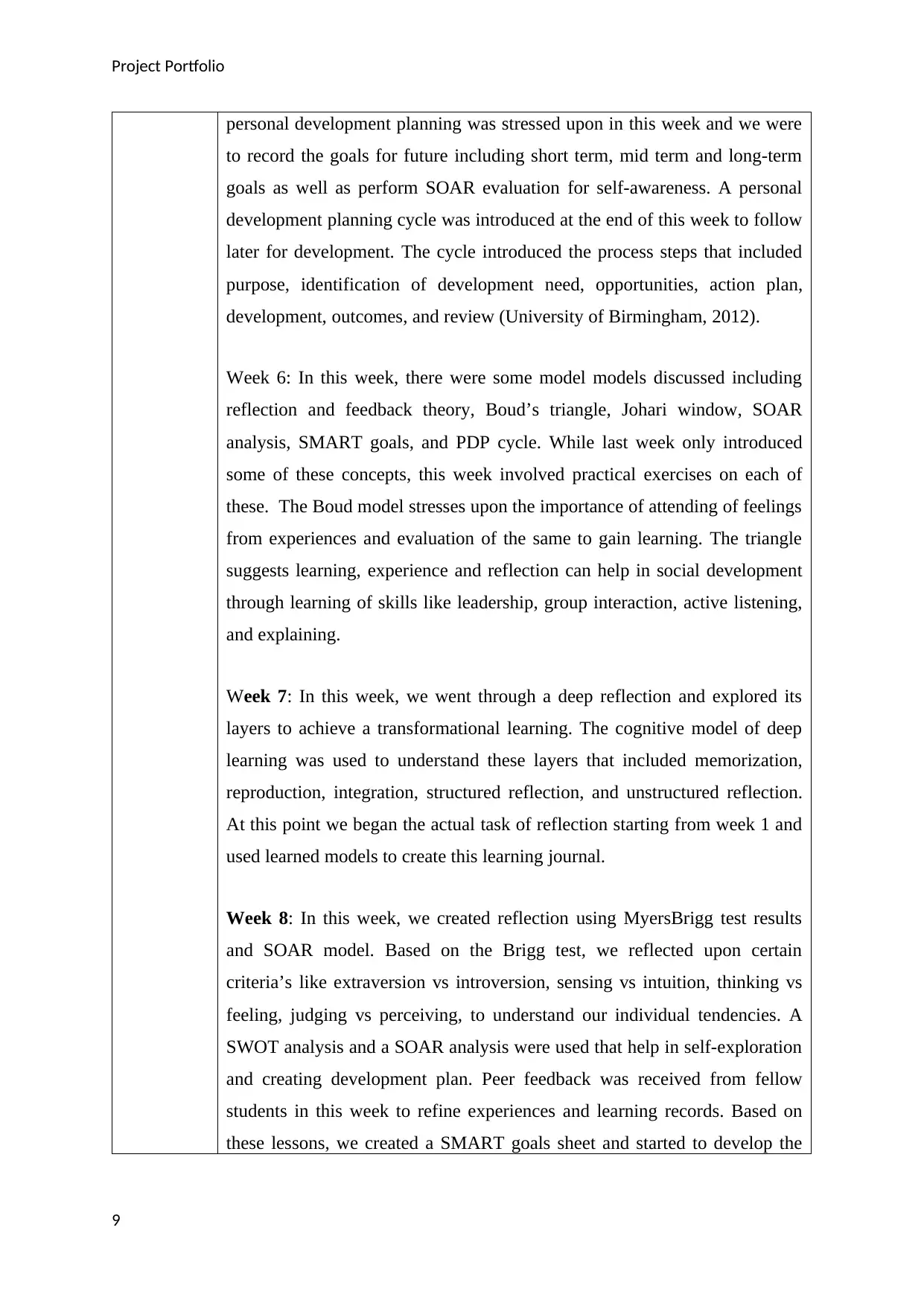
Project Portfolio
personal development planning was stressed upon in this week and we were
to record the goals for future including short term, mid term and long-term
goals as well as perform SOAR evaluation for self-awareness. A personal
development planning cycle was introduced at the end of this week to follow
later for development. The cycle introduced the process steps that included
purpose, identification of development need, opportunities, action plan,
development, outcomes, and review (University of Birmingham, 2012).
Week 6: In this week, there were some model models discussed including
reflection and feedback theory, Boud’s triangle, Johari window, SOAR
analysis, SMART goals, and PDP cycle. While last week only introduced
some of these concepts, this week involved practical exercises on each of
these. The Boud model stresses upon the importance of attending of feelings
from experiences and evaluation of the same to gain learning. The triangle
suggests learning, experience and reflection can help in social development
through learning of skills like leadership, group interaction, active listening,
and explaining.
Week 7: In this week, we went through a deep reflection and explored its
layers to achieve a transformational learning. The cognitive model of deep
learning was used to understand these layers that included memorization,
reproduction, integration, structured reflection, and unstructured reflection.
At this point we began the actual task of reflection starting from week 1 and
used learned models to create this learning journal.
Week 8: In this week, we created reflection using MyersBrigg test results
and SOAR model. Based on the Brigg test, we reflected upon certain
criteria’s like extraversion vs introversion, sensing vs intuition, thinking vs
feeling, judging vs perceiving, to understand our individual tendencies. A
SWOT analysis and a SOAR analysis were used that help in self-exploration
and creating development plan. Peer feedback was received from fellow
students in this week to refine experiences and learning records. Based on
these lessons, we created a SMART goals sheet and started to develop the
9
personal development planning was stressed upon in this week and we were
to record the goals for future including short term, mid term and long-term
goals as well as perform SOAR evaluation for self-awareness. A personal
development planning cycle was introduced at the end of this week to follow
later for development. The cycle introduced the process steps that included
purpose, identification of development need, opportunities, action plan,
development, outcomes, and review (University of Birmingham, 2012).
Week 6: In this week, there were some model models discussed including
reflection and feedback theory, Boud’s triangle, Johari window, SOAR
analysis, SMART goals, and PDP cycle. While last week only introduced
some of these concepts, this week involved practical exercises on each of
these. The Boud model stresses upon the importance of attending of feelings
from experiences and evaluation of the same to gain learning. The triangle
suggests learning, experience and reflection can help in social development
through learning of skills like leadership, group interaction, active listening,
and explaining.
Week 7: In this week, we went through a deep reflection and explored its
layers to achieve a transformational learning. The cognitive model of deep
learning was used to understand these layers that included memorization,
reproduction, integration, structured reflection, and unstructured reflection.
At this point we began the actual task of reflection starting from week 1 and
used learned models to create this learning journal.
Week 8: In this week, we created reflection using MyersBrigg test results
and SOAR model. Based on the Brigg test, we reflected upon certain
criteria’s like extraversion vs introversion, sensing vs intuition, thinking vs
feeling, judging vs perceiving, to understand our individual tendencies. A
SWOT analysis and a SOAR analysis were used that help in self-exploration
and creating development plan. Peer feedback was received from fellow
students in this week to refine experiences and learning records. Based on
these lessons, we created a SMART goals sheet and started to develop the
9
⊘ This is a preview!⊘
Do you want full access?
Subscribe today to unlock all pages.

Trusted by 1+ million students worldwide
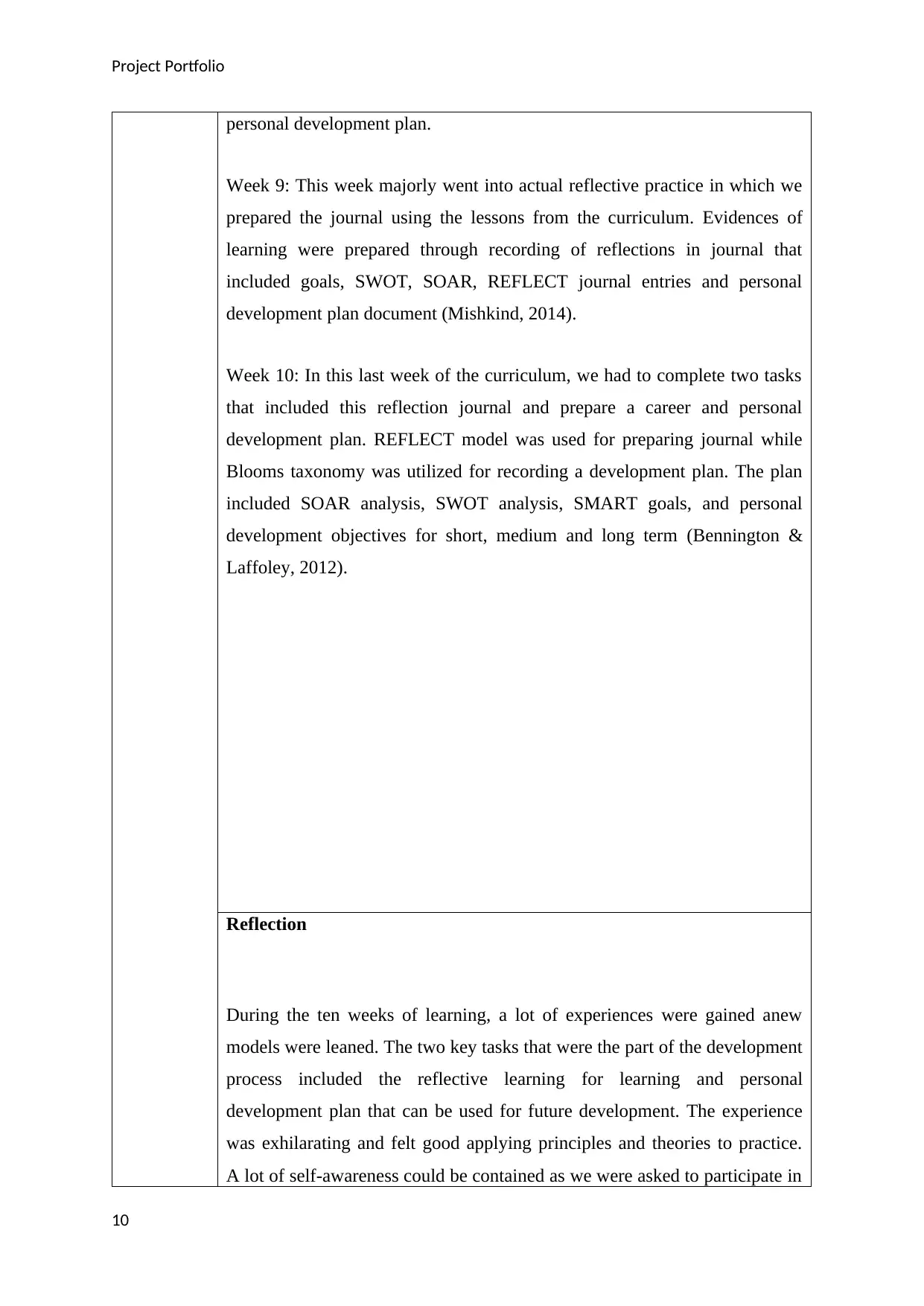
Project Portfolio
personal development plan.
Week 9: This week majorly went into actual reflective practice in which we
prepared the journal using the lessons from the curriculum. Evidences of
learning were prepared through recording of reflections in journal that
included goals, SWOT, SOAR, REFLECT journal entries and personal
development plan document (Mishkind, 2014).
Week 10: In this last week of the curriculum, we had to complete two tasks
that included this reflection journal and prepare a career and personal
development plan. REFLECT model was used for preparing journal while
Blooms taxonomy was utilized for recording a development plan. The plan
included SOAR analysis, SWOT analysis, SMART goals, and personal
development objectives for short, medium and long term (Bennington &
Laffoley, 2012).
Reflection
During the ten weeks of learning, a lot of experiences were gained anew
models were leaned. The two key tasks that were the part of the development
process included the reflective learning for learning and personal
development plan that can be used for future development. The experience
was exhilarating and felt good applying principles and theories to practice.
A lot of self-awareness could be contained as we were asked to participate in
10
personal development plan.
Week 9: This week majorly went into actual reflective practice in which we
prepared the journal using the lessons from the curriculum. Evidences of
learning were prepared through recording of reflections in journal that
included goals, SWOT, SOAR, REFLECT journal entries and personal
development plan document (Mishkind, 2014).
Week 10: In this last week of the curriculum, we had to complete two tasks
that included this reflection journal and prepare a career and personal
development plan. REFLECT model was used for preparing journal while
Blooms taxonomy was utilized for recording a development plan. The plan
included SOAR analysis, SWOT analysis, SMART goals, and personal
development objectives for short, medium and long term (Bennington &
Laffoley, 2012).
Reflection
During the ten weeks of learning, a lot of experiences were gained anew
models were leaned. The two key tasks that were the part of the development
process included the reflective learning for learning and personal
development plan that can be used for future development. The experience
was exhilarating and felt good applying principles and theories to practice.
A lot of self-awareness could be contained as we were asked to participate in
10
Paraphrase This Document
Need a fresh take? Get an instant paraphrase of this document with our AI Paraphraser
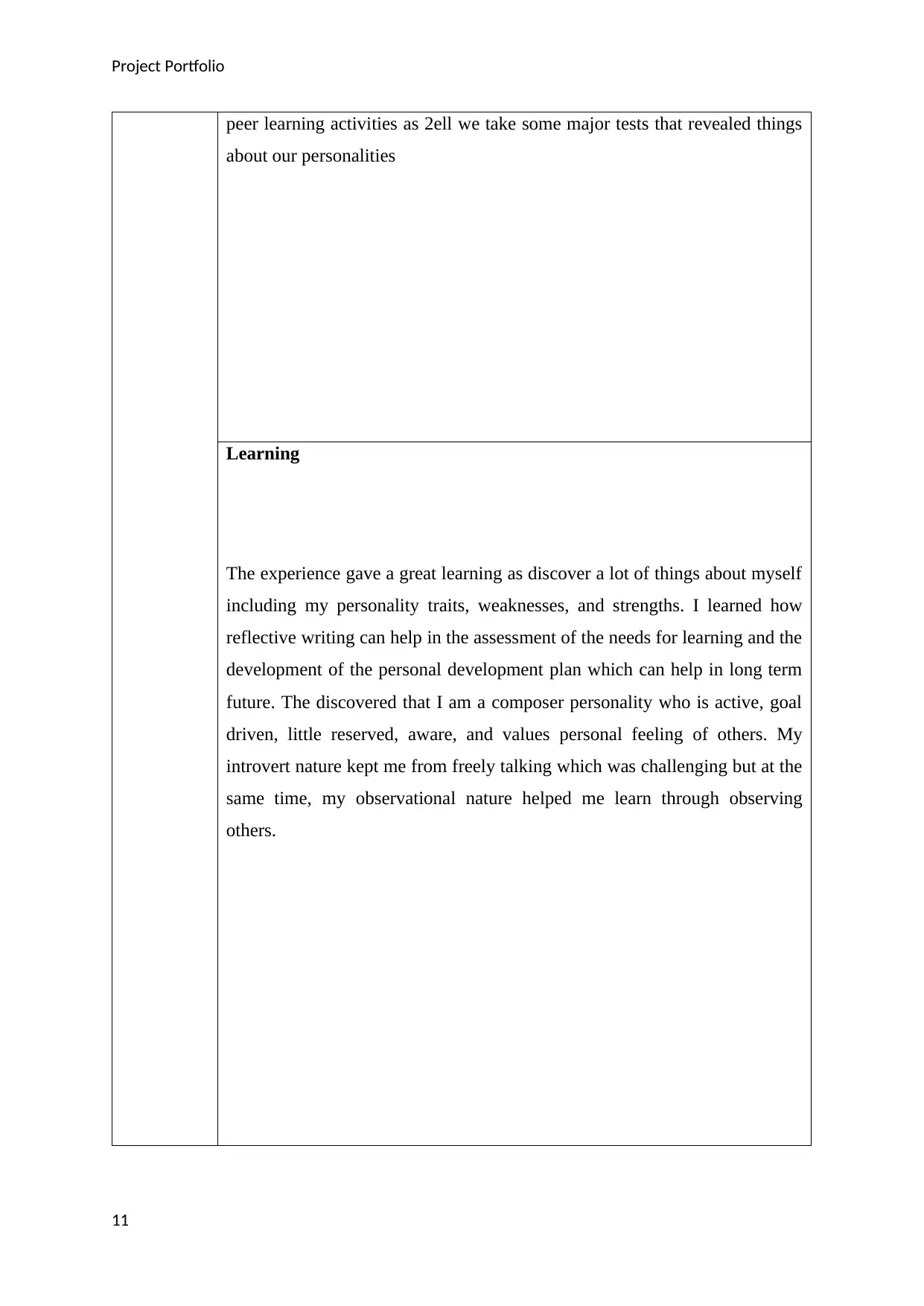
Project Portfolio
peer learning activities as 2ell we take some major tests that revealed things
about our personalities
Learning
The experience gave a great learning as discover a lot of things about myself
including my personality traits, weaknesses, and strengths. I learned how
reflective writing can help in the assessment of the needs for learning and the
development of the personal development plan which can help in long term
future. The discovered that I am a composer personality who is active, goal
driven, little reserved, aware, and values personal feeling of others. My
introvert nature kept me from freely talking which was challenging but at the
same time, my observational nature helped me learn through observing
others.
11
peer learning activities as 2ell we take some major tests that revealed things
about our personalities
Learning
The experience gave a great learning as discover a lot of things about myself
including my personality traits, weaknesses, and strengths. I learned how
reflective writing can help in the assessment of the needs for learning and the
development of the personal development plan which can help in long term
future. The discovered that I am a composer personality who is active, goal
driven, little reserved, aware, and values personal feeling of others. My
introvert nature kept me from freely talking which was challenging but at the
same time, my observational nature helped me learn through observing
others.
11
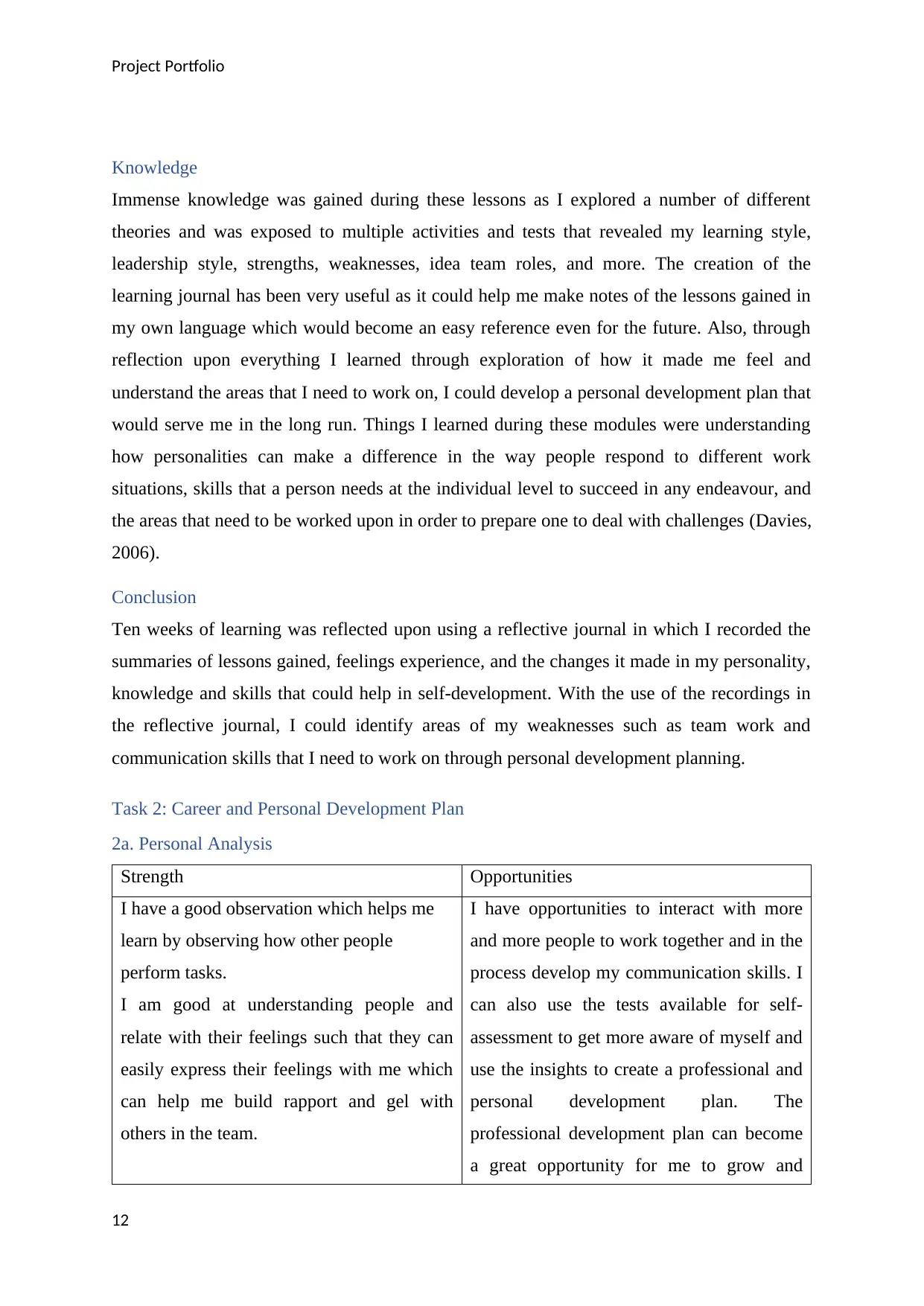
Project Portfolio
Knowledge
Immense knowledge was gained during these lessons as I explored a number of different
theories and was exposed to multiple activities and tests that revealed my learning style,
leadership style, strengths, weaknesses, idea team roles, and more. The creation of the
learning journal has been very useful as it could help me make notes of the lessons gained in
my own language which would become an easy reference even for the future. Also, through
reflection upon everything I learned through exploration of how it made me feel and
understand the areas that I need to work on, I could develop a personal development plan that
would serve me in the long run. Things I learned during these modules were understanding
how personalities can make a difference in the way people respond to different work
situations, skills that a person needs at the individual level to succeed in any endeavour, and
the areas that need to be worked upon in order to prepare one to deal with challenges (Davies,
2006).
Conclusion
Ten weeks of learning was reflected upon using a reflective journal in which I recorded the
summaries of lessons gained, feelings experience, and the changes it made in my personality,
knowledge and skills that could help in self-development. With the use of the recordings in
the reflective journal, I could identify areas of my weaknesses such as team work and
communication skills that I need to work on through personal development planning.
Task 2: Career and Personal Development Plan
2a. Personal Analysis
Strength Opportunities
I have a good observation which helps me
learn by observing how other people
perform tasks.
I am good at understanding people and
relate with their feelings such that they can
easily express their feelings with me which
can help me build rapport and gel with
others in the team.
I have opportunities to interact with more
and more people to work together and in the
process develop my communication skills. I
can also use the tests available for self-
assessment to get more aware of myself and
use the insights to create a professional and
personal development plan. The
professional development plan can become
a great opportunity for me to grow and
12
Knowledge
Immense knowledge was gained during these lessons as I explored a number of different
theories and was exposed to multiple activities and tests that revealed my learning style,
leadership style, strengths, weaknesses, idea team roles, and more. The creation of the
learning journal has been very useful as it could help me make notes of the lessons gained in
my own language which would become an easy reference even for the future. Also, through
reflection upon everything I learned through exploration of how it made me feel and
understand the areas that I need to work on, I could develop a personal development plan that
would serve me in the long run. Things I learned during these modules were understanding
how personalities can make a difference in the way people respond to different work
situations, skills that a person needs at the individual level to succeed in any endeavour, and
the areas that need to be worked upon in order to prepare one to deal with challenges (Davies,
2006).
Conclusion
Ten weeks of learning was reflected upon using a reflective journal in which I recorded the
summaries of lessons gained, feelings experience, and the changes it made in my personality,
knowledge and skills that could help in self-development. With the use of the recordings in
the reflective journal, I could identify areas of my weaknesses such as team work and
communication skills that I need to work on through personal development planning.
Task 2: Career and Personal Development Plan
2a. Personal Analysis
Strength Opportunities
I have a good observation which helps me
learn by observing how other people
perform tasks.
I am good at understanding people and
relate with their feelings such that they can
easily express their feelings with me which
can help me build rapport and gel with
others in the team.
I have opportunities to interact with more
and more people to work together and in the
process develop my communication skills. I
can also use the tests available for self-
assessment to get more aware of myself and
use the insights to create a professional and
personal development plan. The
professional development plan can become
a great opportunity for me to grow and
12
⊘ This is a preview!⊘
Do you want full access?
Subscribe today to unlock all pages.

Trusted by 1+ million students worldwide
1 out of 17
Related Documents
Your All-in-One AI-Powered Toolkit for Academic Success.
+13062052269
info@desklib.com
Available 24*7 on WhatsApp / Email
![[object Object]](/_next/static/media/star-bottom.7253800d.svg)
Unlock your academic potential
Copyright © 2020–2025 A2Z Services. All Rights Reserved. Developed and managed by ZUCOL.


